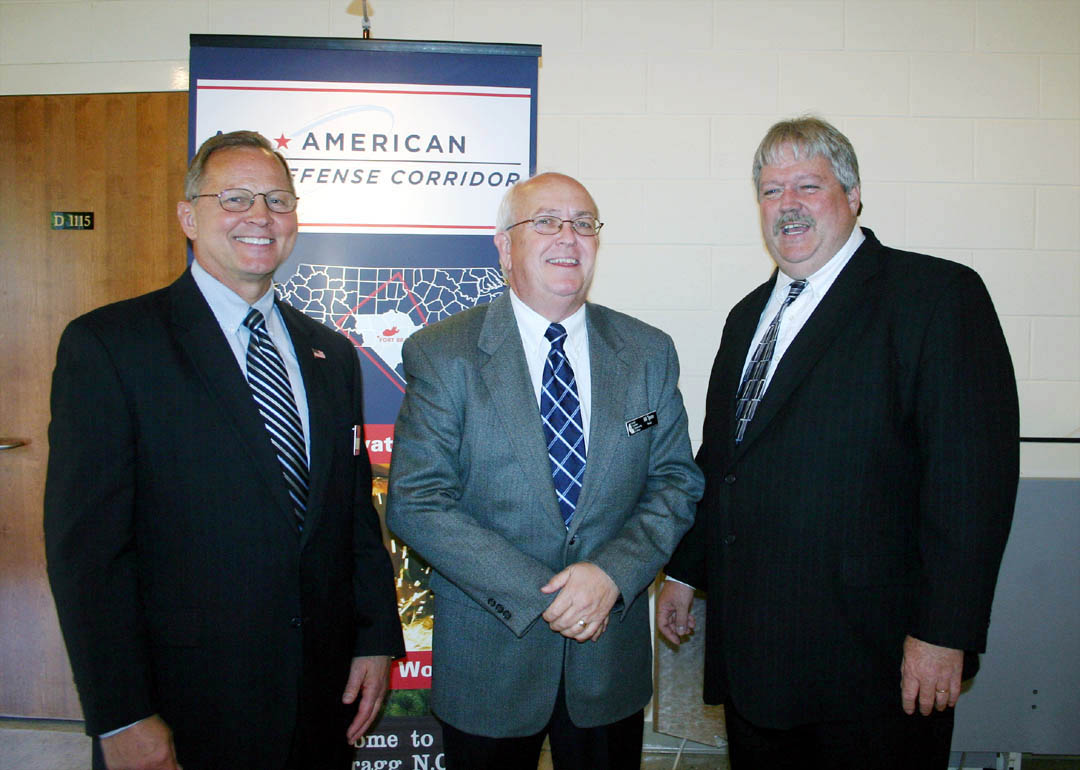
College News
CCCC Harnett provost excited about BRAC
11.11.2008 • College & Community
LILLINGTON – The U.S. Department of Defense’s BRAC initiative means exciting times for Central Carolina Community College, particularly in Harnett County, according to Bill Tyson, the college’s Harnett provost.
As part of its overall BRAC (Base Realignment and Closure) initiative, the DOD is relocating the U.S. Army Forces Command and Reserve Command from Fort McPherson, Georgia, to Fort Bragg. The groundbreaking for the 700,000-square-foot command headquarters is scheduled for Dec. 8 and the commands plan to move into the facility in 2011. About 40,000 new military and civilian personnel are expected to move into the 11-county area around Fort Bragg by 2013.
The influx of military personnel and their families, civilian DOD employees, and the establishment of companies that do business with the commands, will all offer opportunities for the college to grow and expand its offerings, especially in Harnett, Tyson said.
The BRAC Regional Task Force met Oct. 30 for its annual meeting at Snyder Memorial Baptist Church, in Fayetteville. Tyson attended as the representative of the college and a member of the RTF’s Education Committee.
The RTF was established in 2006 to work with BRAC to define, prioritize, and facilitate the changes coming to the area. It includes representatives from the counties around Fort Bragg: Bladen, Cumberland, Harnett, Hoke, Lee, Montgomery, Moore, Richmond, Robeson, Sampson, and Scotland. Tim McNeill, Harnett County commissioner and a trustee of Central Carolina Community College, serves as the RTF chairman.
At the meeting, McNeill spoke about how the RTF has brought the counties, communities, governments, and military together.
“We’ve built a partnership, with the focus of supporting the military and the economic vitality and quality of life for our counties,” he said. “We checked politics at the door and focused on the issues.”
The annual meeting brought together elected officials from the local, state and federal levels, military commanders, and representatives from business and education, to hear about the many changes that are and will take place as a result of BRAC. Among those changes are road improvements, more schools, environmental sustainability, and economic development. Of particular interest to Tyson and the college will be the need for workforce education for the businesses and industries that will serve the relocated commands, as well as educational opportunities for the expanding population.
“Workforce development is the cornerstone of the college's mission,” he said. “Not only can we provide programming related to BRAC initiatives, but, speaking as the Harnett provost, we can give the citizens of Harnett County the chance for real economic change in the form of skills needed for good-paying jobs. The college is working to build the capacity needed to serve current citizens and their families, along with those who move into our service area as a result of the BRAC initiatives.”
He mentioned some BRAC identified needs, including healthcare, defense related industries, sustainable technologies, and business and public services.
“Central Carolina Community College has opportunities here,” he said. “It already offers programs which provide skills that lead to good jobs in all those fields.”
The demand for healthcare professionals will grow in Harnett, both because of Bragg’s expansion and because of the new Harnett Health Systems Central Campus being built in Lillington. Tyson said those tie into the college’s plans to have an Associate Degree Nursing program at the Harnett Campus at some point.
Defense innovation is also one of BRAC’s needs, he said. Central Carolina already has good relationships with defense contractors through the laser-photonics program at its Harnett Campus.
Tyson would also like to see the college’s highly successful sustainable agriculture program at its Chatham Campus replicated at one of the college’s facilities in Harnett County. This would directly tie into a major BRAC RTF goal, growth of sustainable technologies.
“Harnett County is already a major growth area for the college and there will be military members, their families, and civilian base employees who will choose to live in Harnett,” he said. “As the college grows, there will be an expansion of educational opportunities for all. As the county grows, there will be more opportunities for our graduates. It’s certainly an exciting time.”

Members of the BRAC Regional Task Force received an update on the status of the changes being brought about locally by the U.S. Department of Defense’s Base Realignment and Closure initiative. As part of the BRAC, the DOD is relocating the U.S. Army Forces Command and Reserve Command from Fort McPherson, Georgia, to Fort Bragg. The RTF comprises representatives from governments, business, education, and the community from the 11 counties around Fort Bragg. Its purpose is to work with the military and state and federal governments in supporting the BRAC while improving the economy and quality of life in the RTF area. The RTF met for its annual meeting Oct. 30 at Snyder Memorial Baptist Church, in Fayetteville. Among those attending were (from left) Paul Dordal, BRAC RTF executive director; Bill Tyson, Harnett provost for Central Carolina Community College and a member of BRAC’s Education Committee: and Tim McNeill, Harnett County commissioner and chairman of the BRAC RTF.
- Central Carolina Community College
- Serving Chatham, Harnett, & Lee Counties, NC
- 1-800-682-8353

